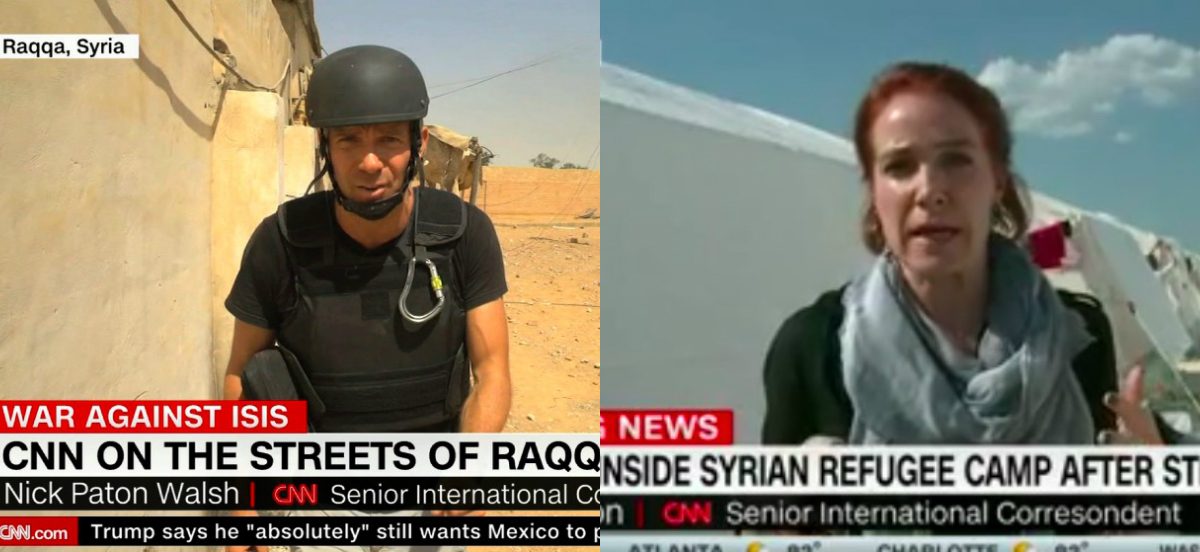Exclusive: CNN Journalists Reveal What It Was Like Reporting in Syria After Chemical Attacks

Neither Nick Paton Walsh nor Arwa Damon can keep a house cactus alive. The two CNN senior international correspondents have both tried, but neither seems to necessarily crave or even enjoy the “monotony” that comes with domesticated, every day life in a stable region of the world.
Instead, Walsh and Damon would rather be on the frontline of danger, covering the fall of ISIS in Iraq and Syria, as well as the nation’s ongoing civil war. Mediaite caught up with the two journalists as they visited New York City to be presented with the Overseas Press Club of America’s David Kaplan Award for CNN’s reporting from abroad.
“You sort of feel slightly pathetic in a nice hotel room in New York, talking on the phone about yourself while all the people you left behind in these places are still living that trauma out,” Walsh said Friday morning.
“Anyone who goes and covers the types of stories we cover and doesn’t come back impacted is either lying to themselves, or should not be doing this kind of work,” Damon added.
(Editor’s note: The following conversation has been lightly edited and condensed for clarity.)
Mediaite: Despite the Syrian conflict’s extraordinary impact on innocent civilians, there remains a general lack of awareness — and even interest — in what’s happening in the region. What sort of impact does that have on your day-to-day function as correspondents?
Arwa Damon: When we went into Syria shortly after the chemical strikes in Douma and the retaliatory attacks led by the U.S. and France, the people were very aware of the fact that their lives have become politicized, and they’ve been aware of this for years. What makes it difficult is not necessarily getting to the story or getting it on air, which is incredibly challenging, but getting people to talk to you who fundamentally believe that nobody cares about what they’re going through. It’s the hardest thing to walk into a refugee camp and try to talk to people who look at you and say, ‘What’s the point of talking to you? Why should we tell you what happened to us? We’ve been talking to you and trying to tell our story for the last six years and the world is making a mockery of us.’
Nick Paton Walsh: I know for a fact CNN has provided more coverage and resources toward Syria coverage than anyone else in the last six years. But it’s still difficult to look people in the face and say, “Tell me your story because people are paying attention,” when often they’re not.
Mediaite: Is there a general consensus on the ground among Syrians about President Donald Trump and the actions his administration has taken?
NPW: I’m not sure there’s necessarily much back thought to it, in that they feel at least there’s action as opposed to the confusing five years of the Obama administration’s interactions with the conflict — which was as little as they could possibly do without being accused of actually doing nothing.
AD: I also think there’s widespread disappointment too, because I think Syrians thought this administration would do more that’s not necessarily in terms of bombing sites, but actually doing more to stop deaths. What they hoped was that this administration would come in hard and play the cards to get something like a no fly zone set up, which would actually save lives. What they’re now saying is that America is once again playing politics and gambling with other people’s lives.
Mediaite: Do you have any advice for people around the world who are either apathetic toward the ongoing politicization of the conflict, or feel compelled to help in some way but don’t know how?
NPW: Actually, Arwa, when she’s not running around and leaving a huge dust trail for me to choke on, runs a non profit called INARA, which is an extraordinary use of her spare time. The non profit serves Syrian and Iraqi children who are the victims of war and require urgent or life-changing surgery. It’s a simple idea, really: find the cases and get someone to pay for it.
AD: It came about because of exactly what you’re talking about. There was this apathy out there, and maybe the journalism wasn’t having the impact it should have made. As journalists in the field, we’ve all come across cases of people we can’t report on but who need medical attention, and a lot of us have connections to help make that happen. So why not make an organization that can do it under this umbrella. It’s all about doing small little things that can change someone’s entire narrative. Especially for the children. In 2008, I interviewed this little Iraqi boy Youssef, who was burnt by a bunch of masked men when he was five. Fast forward to when he’s 15 and he doesn’t actually remember the attack anymore; all he remembers is people being kind to him. That’s a life-changing moment.
Mediaite: It must be an unusual transition to go from reporting under those conditions back to normal life. Have you dealt with any side effects?
NPW: (Laughs) I have no idea what you’re talking about. Actually, yes, I’ve just moved back to London after 15 years, and it’s really odd to be able to drink from the tap, and to have a normal routine. I actually have house keys instead of a hotel pass, and three pieces of furniture.
AD: I killed a cactus.
NPW: Me too, actually. There was a girl I was seeing years ago who gave me some and said, “Don’t worry, you don’t have to water them.” But I was freaked out by seeing the monotony of these cacti, so I binned them.
AD: In all seriousness, I think anyone who goes and covers the types of stories we cover and doesn’t come back impacted is either lying to themselves, or should not be doing this kind of work. Because if we are going to be telling these people’s stories to the rest of the world then we become — at the risk of me sounding like a complete cliche — their voice. The only way to do their story justice is by inserting a certain amount of compassion into it. You have to feel.
NPW: I was trying to think yesterday of where this all began and it was November 2013, when we started covering this new group called ISIS that had taken over a few small towns and looked really extreme and nasty. This does take a chunk out of you, and you sort of feel slightly pathetic in a nice hotel room in New York, talking about yourself while all the people you left behind in these places are still living that trauma out.
[image via screengrab]
—
Follow Chris Riotta (@ChrisRiotta) on Twitter
New: The Mediaite One-Sheet "Newsletter of Newsletters"
Your daily summary and analysis of what the many, many media newsletters are saying and reporting. Subscribe now!






Comments
↓ Scroll down for comments ↓